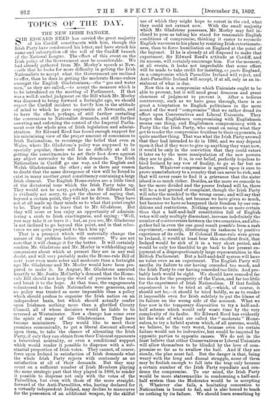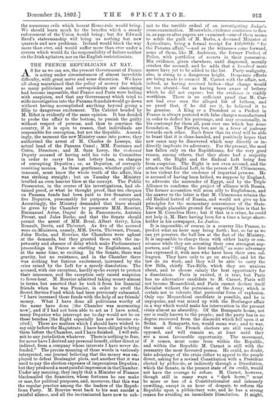TOPICS OF THE DAY.
THE NEW IRISH DANGER.
IR EDWARD REED has carried the great majority L. of his Cardiff constituents with him, though the Irish Party have condemned his letter, and have struck his name and subscription off the roll of the Cardiff branch of the National League. The effect of this event on the Irish policy of the Government may be considerable. We had already gathered from Mr. Morley's speech at New- castle that he looks for more difficulty in getting the Irish Nationalists to accept what the Government are inclined to offer, than he does in getting the moderate Home-rulers amongst the English Gladstonians,—the "gas and water men," as they are called,—to accept the measure which is to be introduced on the meeting of Parliament. If that was a well-fk unded judgment on the Bill which Mr. Morley was disposed to bring forward a fortnight ago, we should expect the Cardiff incident to fortify him in the attitude of mind to which he gave expression at Newcastle, and to have the effect, perhaps, of still further curtailing the concessions to Nationalist demands, and still further asserting and enforcing the control of the Imperial Parlia- ment over the whole area of Irish legislation and admini- stration. Sir Edward Reed has found enough support for his minimising view of the proper amount of concession to Irish Nationalism, to encourage the belief that even in 'Wales, where Mr. Gladstone's policy was supposed to be specially popular, there will be no difficulty at all in getting the constituencies to set their foot down against any abject surrender to the Irish demands. The Irish Nationalists in Cardiff go one way, and the English and Welsh Gladstonians the other ; nor is there any reason to doubt that the same divergence of view will be found to exist in many another great constituency containing a large Irish element. The English Home-rulers are a little tired of the dictatorial tone which the Irish Party take up. They would not be sorry, probably, as Sir Edward Reed is evidently not sorry, to get the chance of saying that, beyond a certain point, they will not be driven. They have not at all made up their minds as to what that point ought to be. They wish to leave that to Mr. Gladstone. But they will more or less enjoy an opportunity of adminis- tering a snub to Irish exactingness, and saying : Well, you may take it or leave it ; but, as you see, Mr. Gladstone is not inclined to go beyond this point, and in that reluc- tance we are quite prepared to back him up.' That is a prospect which will materially change the nature of the problem before the country. We are not sure that it will change it for the better. It will certainly confirm Mr. Gladstone and Mr. Morley in withholding any concessions about which at present they are in any real doubt, and will very probably make the Home-rule Bill of next year even more sober and moderate than a fortnight ago Mr. Gladstone and Mr. Morley would have been pre- pared to make it. In August, Mr. Gladstone assented heartily to Mr. Justin McCarthy's demand that the Home- rule Bill should not keep the word of promise to the ear, and break it to the hope. At that time, the engagements volunteered to the Irish Nationalists were generous, and no policy was treated as more impossible than a policy which should profess to organise the Irish nation on an independent basis, but which should actually confer upon Irishmen nothing more than a glorified County Council, all of whose decisions would be liable to be reversed at Westminster. Now a change has come over the spirit of many of the Gladstonians. They have become minimisers. They would like to meet their promises economically, to get a liberal discount allowed upon them, to take the chance of alienating the Irish Party, if only they can obtain from their Unionist opponents a benevolent neutrality, or even a conditional support which would render it possible to dispense with a sub- stantial proportion of Irish votes. They cannot, of course, force upon Ireland in satisfaction of Irish demands what the whole Irish Party rejects with contumely as no satisfaction at all of their demands. But they may count on a sufficient number of Irish Members playing the same strategic part that they played in 1886, to render it possible to dispense not only with the votes of the Parnellites, but even with those of the more straight- forward of the Anti-Parnellites, who, having declared for a virtually independent Ireland, may decline to manceuvre for the possession of an additional weapon, by the skilful use of which they might hope to extort in the end, what they could not extract now. With the small majority which Mr. Gladstone possesses, Mr. Morley may feel in- clined to pose as taking his stand for reasonable English conditions of compromise, thinking it easier to reconcile English waverers to his plans by resisting Irish extortionate- ness, than to force humiliation on England at the point of the bayonet. If he is already at all disposed to make that experiment, Sir Edward Reed's attitude at Cardiff, and its success, will certainly encourage him. For the moment,. at all events, it looks not improbable that some effort will be made to take credit for insisting, ex parts England,. on a compromise which Parnellite Ireland will reject, and Anti-Parnellite Ireland will accept, if at all, only as an in- stalment of what is due.
Now this is a compromise which Unionists ought to be- able to prevent, but it will need great firmness and great clearness of judgment to prevent it. After a tedious controversy, such as we have gone through, there is so. great a temptation to English politicians in the mere sound of the word " compromise " that we rather dread its effect upon Conversatives and Liberal Unionists. They forget that Englishmen compromising with Englishmen means one thing, and Englishmen compromising with a> Party like the Irish Party, who count on using what they get to render the compromise fruitless to their opponents, is quite another thing. That was what the Irish Party avowed that they had intended to do in 1886, and we may depend upon it that if they were to give up anything they want now,. it would be only in the conviction that they could extort it later on by the mere manipulation of the new powers. they are to gain. It is, in our belief, perfectly hopeless to. bind Ireland by any vow of finality, to go so far but ne- farther. Whatever compromise is agreed upon is sure to. prove unsatisfactory to a country that can never be rich, and that will never cease to find it a grievance that the sister island is so much richer. Besides, as the more we concede to her the more divided and the poorer Ireland will be, there will be a real ground of complaint, though the Irish Party will refer the mischief to the wrong cause; and will say that Home-rule has failed, not because we have given so much, but because we have so hampered their freedom by our con- ditions and restrictions. Nothing seems to us more certain than that a half-and-half constitution full of English vetos will only multiply discontent, increase indefinitely the number of controversies between the two countries, and alto- gether fail in even the one good result possible from a rash experiment,—namely, illustrating its rashness by positive experience of its evils. If Colonial Home-rule were given to Ireland, it would at least bear this excellent fruit, that Ireland would be sick of it in a very short period, and would be only too thankful to go back to her present en- joyment of a disproportionately large representation in the British Parliament. But a half-and-half system will have no value even as an experiment. The English Party will ascribe its failure to our having conceded too much, and the Irish Party to our having conceded too little. And pro- bably both would be right. We should have conceded far too much for the prosperity of the Union, and far too little for the experiment of Irish Nationalism. If that foolish experiment is to be tried at all,—which, of course, it should not be,—it should be tried boldly, so as to render it impossible even for Irish subtlety to put the blame of its failure on the wrong side of the account. What we fear now is the temporary disposition to try a half-and- half scheme which would only waste time by the very complexity of its faults. Sir Edward Reed has evidently hit the wish of what are called the " moderate " Home- rulers, to try a hybrid system which, of all systems, would, we believe, be the very worst, because even its certain failure would not be instructive, but would be imputed by opposite parties to opposite causes. We do not in the least believe that either Conservatives or Liberal Unionists will allow themselves to be blinded by the love of com- promise so far as to swallow the bait. And if they are steady, the plan must fail. But the danger is that, being weary with the long and dismal struggle, some of them may be foolish enough to fall into the trap only because a certain number of the Irish Party repudiate and con- demn the compromise. To our mind, the Irish Party would be more statesmanlike in condemning a half-and- half system than the Moderates would be in accepting it. Whatever else fails, a hesitating concession to Nationalism is bound to fail, and is also bound to teach us nothing by its failure. We should learn something by the numerous evils which honest Home-rule would bring. We should learn much by the benefits which a steady enforcement of the Union would bring ; but Sir Edward Reed's statesmanship will bring us nothing but new quarrels and new problems. Ireland would block the way more than ever, and would suffer more than ever under a system which would fix the responsibility of failure neither on the Irish agitators, nor on the English restrictionists.



































 Previous page
Previous page